Free Data Analytics Course
Jumpstart your journey with 25 essential learning units in data analytics. No cost, just knowledge.
To start your career in data analytics, you first need to get a job as an entry-level data analyst. But what is the next step? And where do you go from this entry-level position?
Fortunately, data analysis is an expansive and diverse field that incorporates different disciplines, including information technology, business analysis, project management, and more.
This means that a career path for data analyst professionals can look different based on an individual’s particular interests and preferences. This guide will discuss the standard data analyst career path—along with its variations—for people who want to build their data analytics careers.
Is Data Analytics a Good Career?
Yes, data analytics is an excellent career for people with critical thinking skills who want to progress in their profession over time.
Entry-level positions pay well above $50,000, while experts can earn up to $100,000, depending on where they work and the position they hold.
In keeping with the modern world’s inclination towards information-based strategies and decisions, it is not wrong to say that data analytics is one of the most in-demand career fields.
Data analysts are sought-after professionals who serve in high positions in renowned tech, eCommerce, pharmaceutical, and manufacturing industries.


Become a Data Analyst. Land a Job or Your Money Back.
Transform real-world datasets into actionable recommendations. Master technical and strategic thinking skills and frameworks. Land a job — or your money back.
Career Paths for Data Analysts
The career path for data analyst professionals depends on their skills and interests. Read on for some possible data analyst career progression options.
Entry-Level Data Analyst
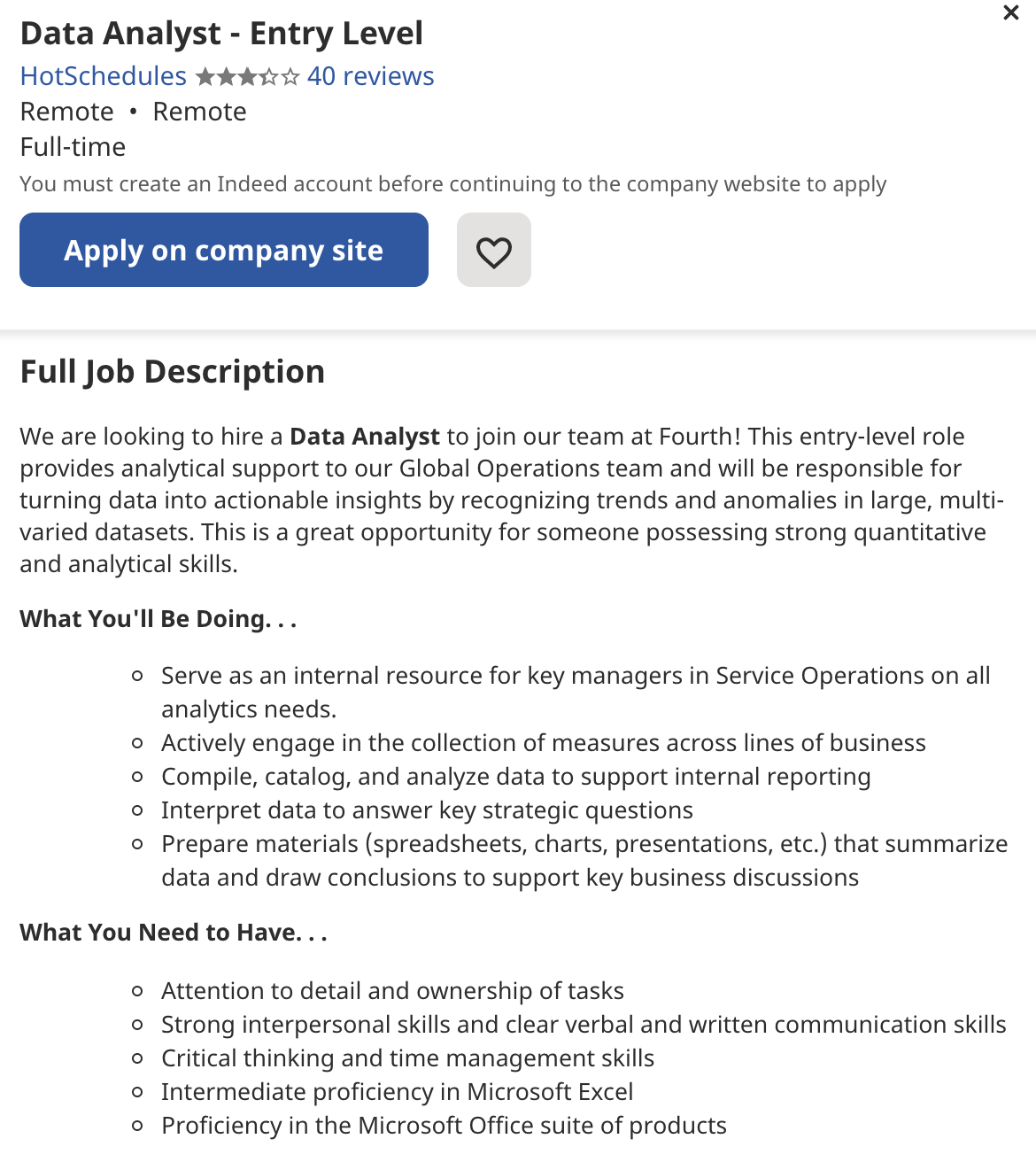
All data analysts have the same job of uncovering the message a piece of data is conveying. However, the roles differ across positions and seniority levels.
As an entry-level data analyst, you will not be taking on business-critical tasks individually. Instead, entry-level data analysts work in teams, supervised mainly by senior analysts or consultants.
Here are some of the typical roles filled by entry-level data analysts in a business setting:
- Data Collection: You will be responsible for collecting data from reliable, accurate, and safe sources. Subsequently, you will have to record this data and store it in existing databases or data storage systems.
- Data Cleaning: Not every piece of data collected is used in interpretation, analysis, or decision-making. Instead, data has to be “cleaned” before it can be further processed. An entry-level data analyst performs data cleaning through different tasks, such as standardization, identifying missing values, and de-duping.
- Making Reports: After conducting basic analyses, you will also have to write reports about your findings, primarily using tools like Power Bi and MS Excel.
An entry-level data analyst does not only differ from a senior business analyst in terms of their understanding of data analysis. Some other differences include:
- Education: Entry-level analysts often have a bachelor’s degree, while senior analysts may have a master’s degree or higher in their respective fields.
- Experience: Senior analysts are more experienced and have worked on a wide range of projects in their careers.
- Programming Skills: Senior analysts are often competent in different programming languages, such as R and Python.
- Analytics Skills: Over the years, senior analysts have developed specific analytical skills that cannot be acquired without substantial experience.
Requirements and Qualifications
To get a job as an entry-level data analyst, you should have a bachelor’s degree in computer science or a relevant field. Alternatively, you could show certification on your resume to help score a data analyst job.
For instance, the Springoard Data Analytics Bootcamp is a remarkable mentorship program that teaches business thinking and technical skills, both of which are required for a data analytics career.
You can learn at your own pace with one-on-one mentorship from expert data analysts and get valuable advice from career coaches and student advisors.
Aside from certification, you should also know the following tools and software:
- SQL
- MS Excel
- Tableau
- Python
Entry-Level Data Analyst Salary
The average base pay for an entry-level data analyst is $41,374 per year, and it can be as high as $62,000, based on your geographical location and your employer.
Junior Data Analyst
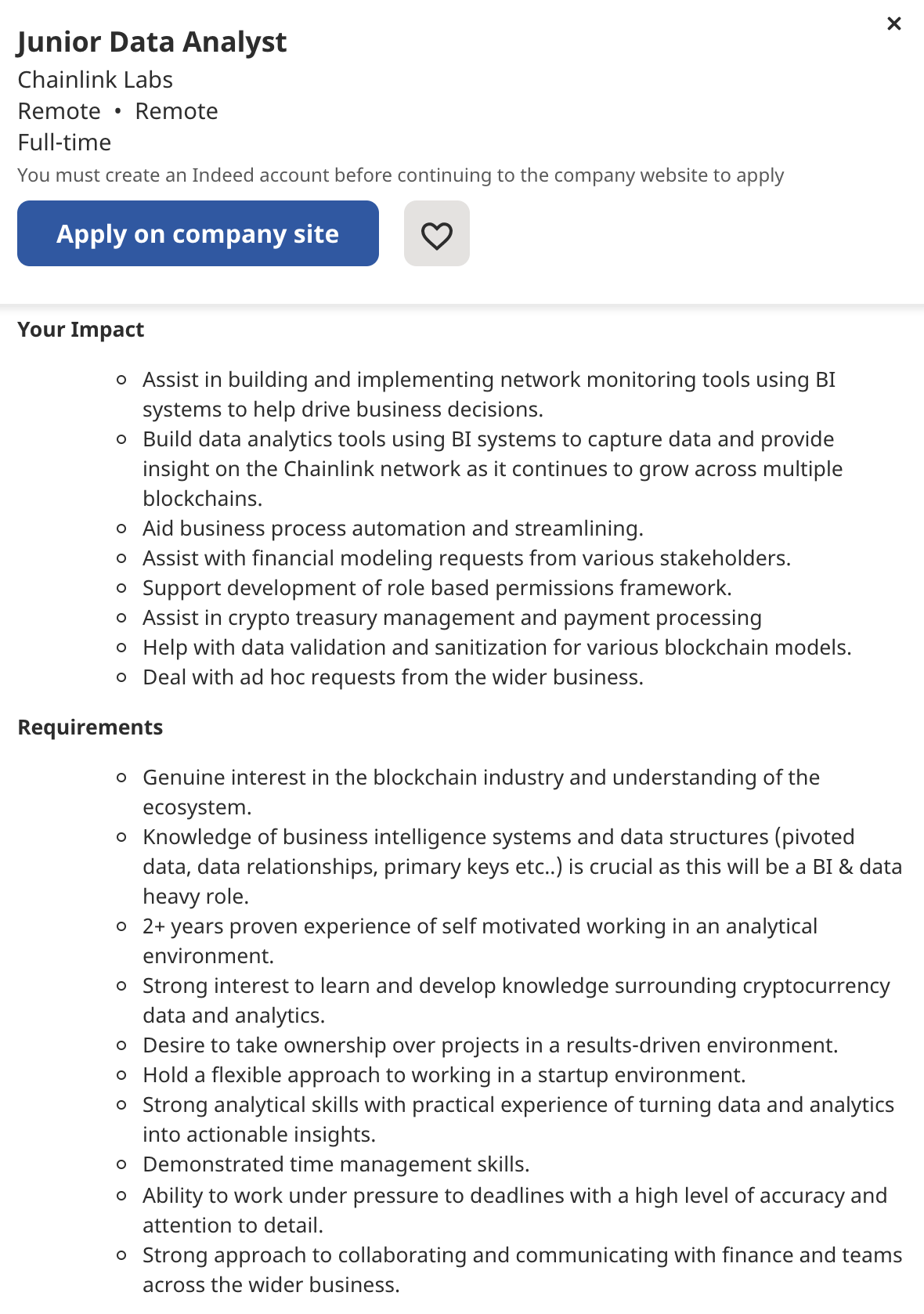
The initial career path for data analyst professionals often begins by serving as a junior data analyst at an organization.
Junior data analysts collect and analyze data, assisting the company in making data-based and well-informed decisions.
They are employed by a multitude of industries, such as telecommunications, information technology, and banks. Some primary duties of junior data analysts include pattern identification, data visualizations, and creating dashboards.
Here are some real-life examples of tasks junior data analysts have to do:
- Developing Java application for a text file reformat automation
- Automating processes for pulling and loading data
- Developing VBA applications that collect data based on different production key performance indicators
- Logging information into Tableau, which is a statistical analysis and business intelligence tool
- Using predictive data analysis tools to employ business analytics and forecast trends
- Performing data extraction, processing, manipulation, and storage
- Developing SharePoint sites and maintaining them for the team
Requirements and Qualifications
At a minimum, junior data analysts should have an AS degree. However, a bachelor’s degree in statistics, mathematics, computer science, or information management is preferred.
Additionally, these jobs have the following requirements:
- A minimum of one year of experience working with large databases
- Organizational and quantitative skills
- Ability to work on a team
- Presentation skills
- Knowledge of SQL, Python, MS Excel, and business administration tools
Junior Data Analyst Salary
According to Zippia, junior data analysts earn $53,188 a year on average. The top 10% of professionals make up to $71,000 a year, while the bottom 10% earn $39,000 a year.
The salaries differ across cities and states, with Washington, D.C., paying the highest at $75,730.
Senior Data Analyst
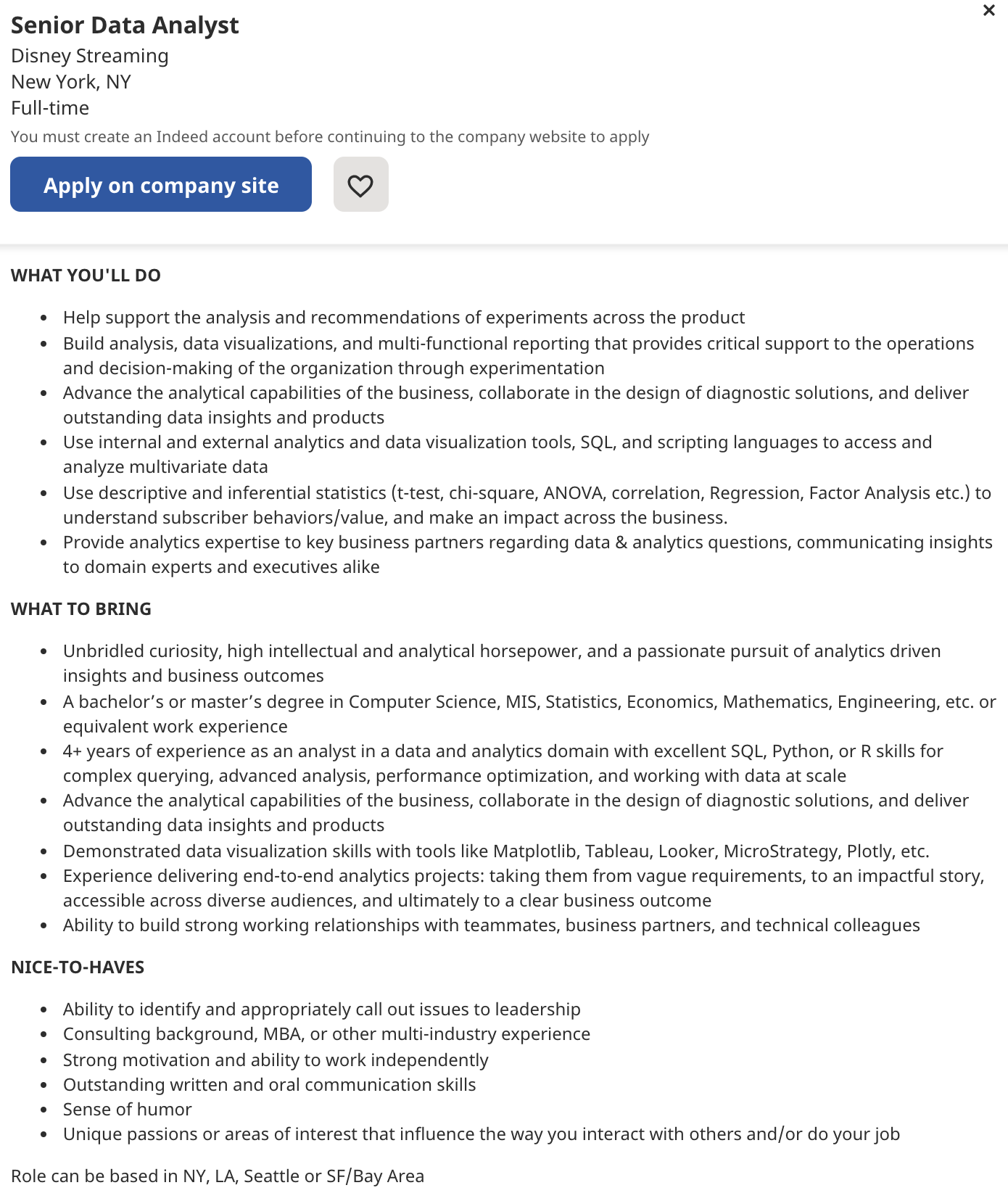
Senior data analysts often supervise a team of junior data analysts to interpret data and track metrics that reflect an organization’s performance. Moreover, senior professionals are in contact with management teams and stakeholders to improve business processes.
As a senior data analyst, you will be responsible for coming up with efficient business solutions that enhance an organization’s current workflow.
Moreover, you have to debug, document, support, and code applications, often developing new ones as per your business requirements.
Requirements and Qualifications
To get a job as a senior data analyst, you should have a bachelor’s degree in information technology, applied math, information systems, business administration, or statistics.
Here are some additional requirements:
- A minimum of five years of experience
- Experience in trend forecasting, modeling, and report creation
- Knowledge of SQL and programming languages
- Communication, analytical, interpersonal, MS Office, and computer skills
Senior Data Analyst Salary
The average senior data analyst salary is $97,398 per year. The highest salary senior data analysts can earn is $133,000 per year.
Get To Know Other Data Analytics Students
Cleo Valencia
Student In The Data Analytics Bootcamp at Springboard
Shelly Applegate
Sales BI Analyst at Mars Corporation
Jon Shepard
VP Of AI Research Strategy And Execution at J.P. Morgan
Data Analytics Manager or Director
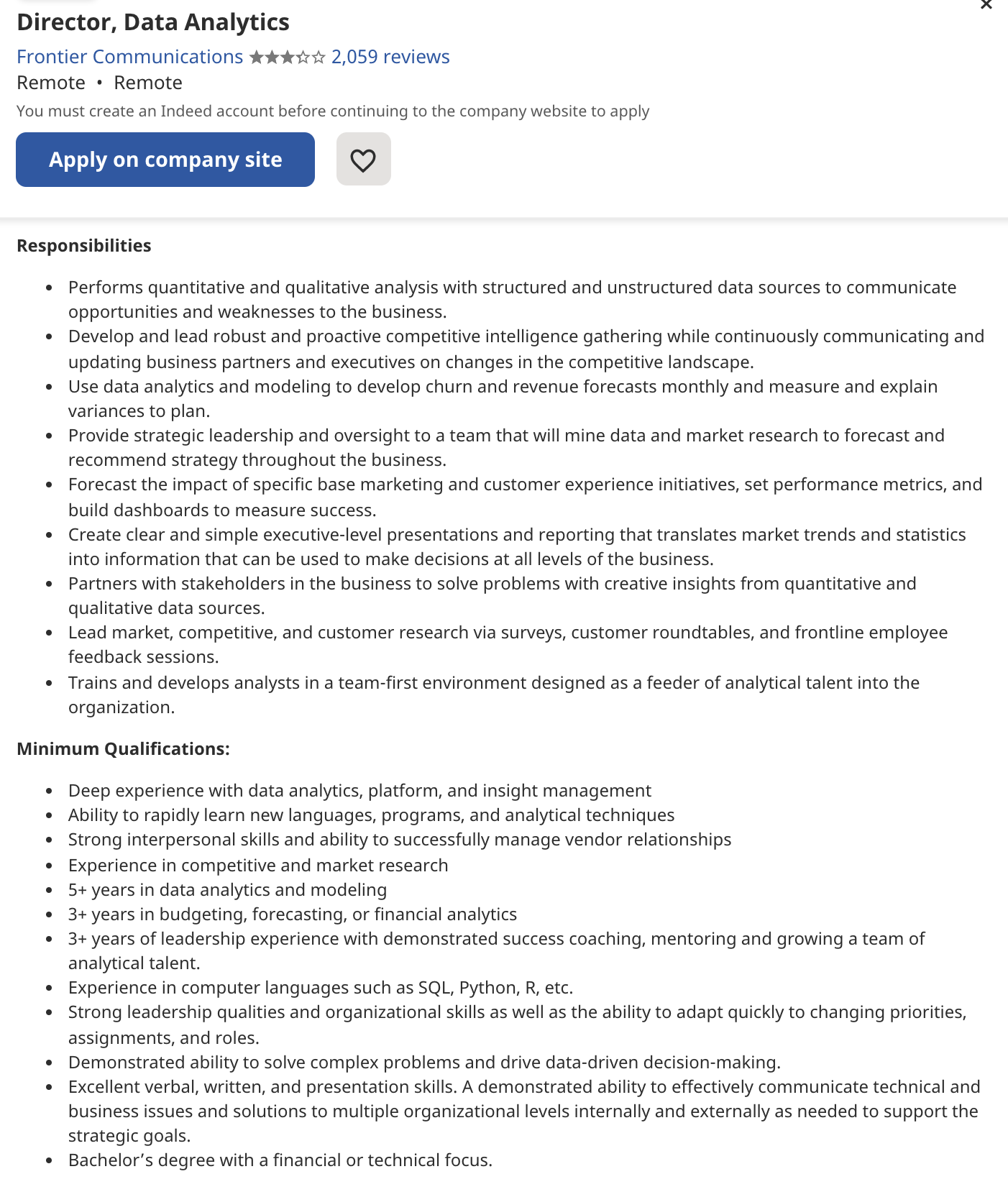
Data analytics managers develop and implement comprehensive business strategies and tools to transform raw data into business insights.
Other experts at the company later use these insights to make decisions and strategies for the organization.
Here are some responsibilities of an analytic director or manager:
- Building and developing data models, data automation systems, performance metrics, and reporting systems
- Designing technical processes to deal with business issues
- Overseeing the delivery of insights and reports used for analyzing business functions and performance metrics
- Recruiting entry-level analysts
- Maintaining the accuracy of deliverables and data reports
- Examining the results from analytical initiatives and reporting them to leadership, stakeholders, product teams, and the sales department
- Developing quality controls and implementing departmental standards to meet the organization’s expectations
- Communicating business impacts and results from insights to internal and external stakeholders
Requirements and Qualifications
Along with a bachelor’s degree, data analytics management jobs have the following requirements:
- Strong programming skills for SAS, SQL, etc.
- Knowledge of data tools, like Hadoop, Aster, and Teradata
- Knowledge of data visualization tools, like Raw and Tableau
- Experience using PowerPoint, Word, and Excel
Data Analytics Manager or Director Salary
The median U.S. salary for data analytics directors is $157,880. The lower 10% make $119,384, while the highest 10% earn $194,866 per year.
Chief Data Officer
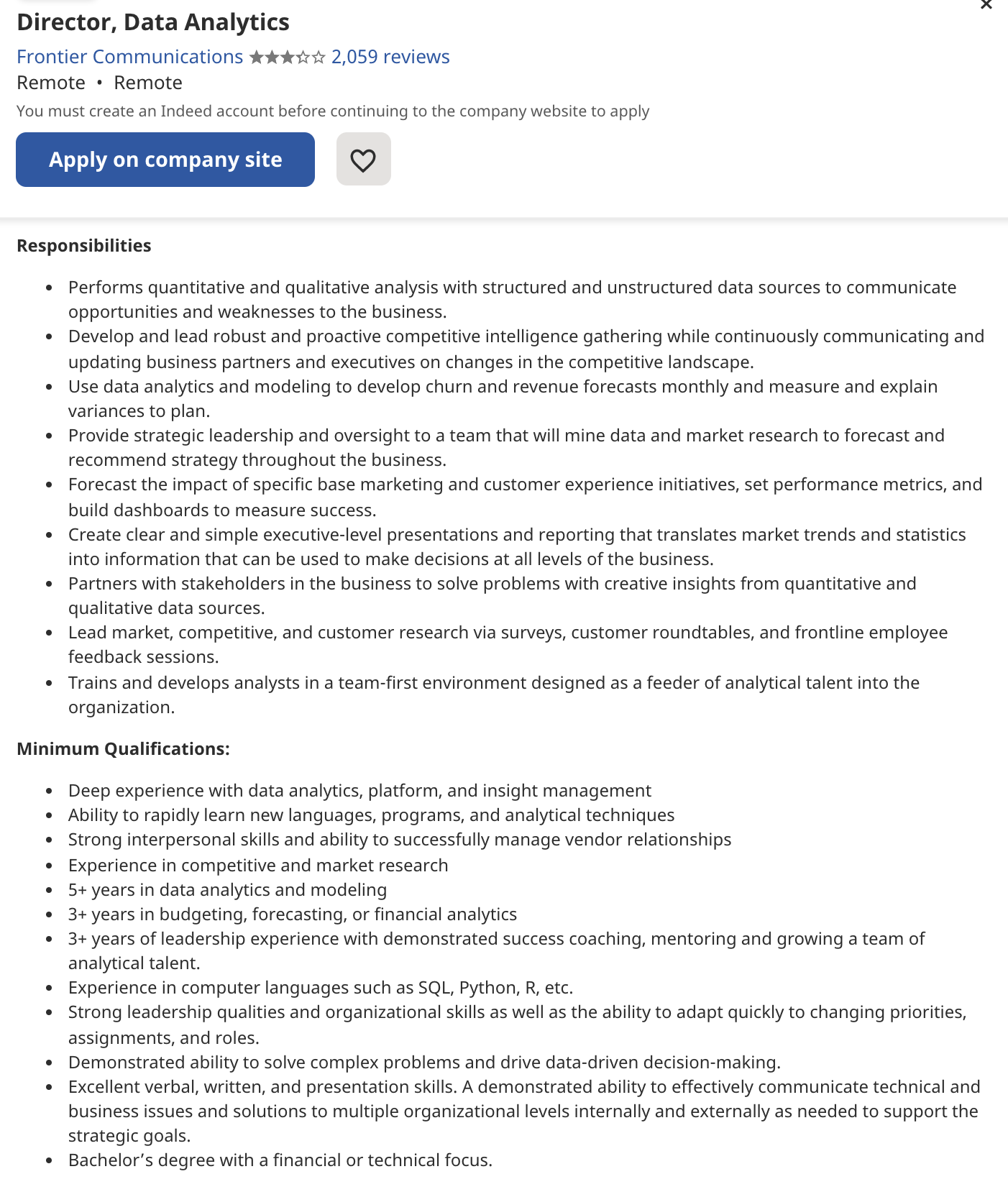
A chief data officer holds a senior executive position in the organization and is responsible for data governance and utilization. As a chief data officer, you will understand strategies that can be used to drive the business in the right direction.
Afterward, the chief data officer must justify these strategies to stakeholders and investors.
Here are some responsibilities of a chief data officer:
- Creating data management systems for secure and efficient data processing and collection
- Establishing an organizational culture that eases data sharing to make informed decisions
- Implementing data analytics to lower pain points and increase profits
- Keeping up with data protection regulations to avoid data breaches
- Ensuring that information access is authorized
- Leading data architecture and infrastructure design
- Developing meaningful systems for data analysis
- Implementing measures for the protection of data being stored and transmitted
Requirements and Qualifications
Here are the requirements and qualifications you will need to get a job as a chief data officer:
- Bachelor’s degree in a tech-related field, although many employers prefer master’s degrees
- Five to 10 years of experience in a senior data analytics or management role
- Strong communication and leadership skills
- Analytically inclined mindset
- Presentation and project management skills
Chief Data Officer Salary
In the United States, chief data officers earn a median salary of $282,500, while the average salary range is from $135,000 to $1,000,000. It is a high-paying job that usually also comes with additional perks.
Freelance Data Analyst
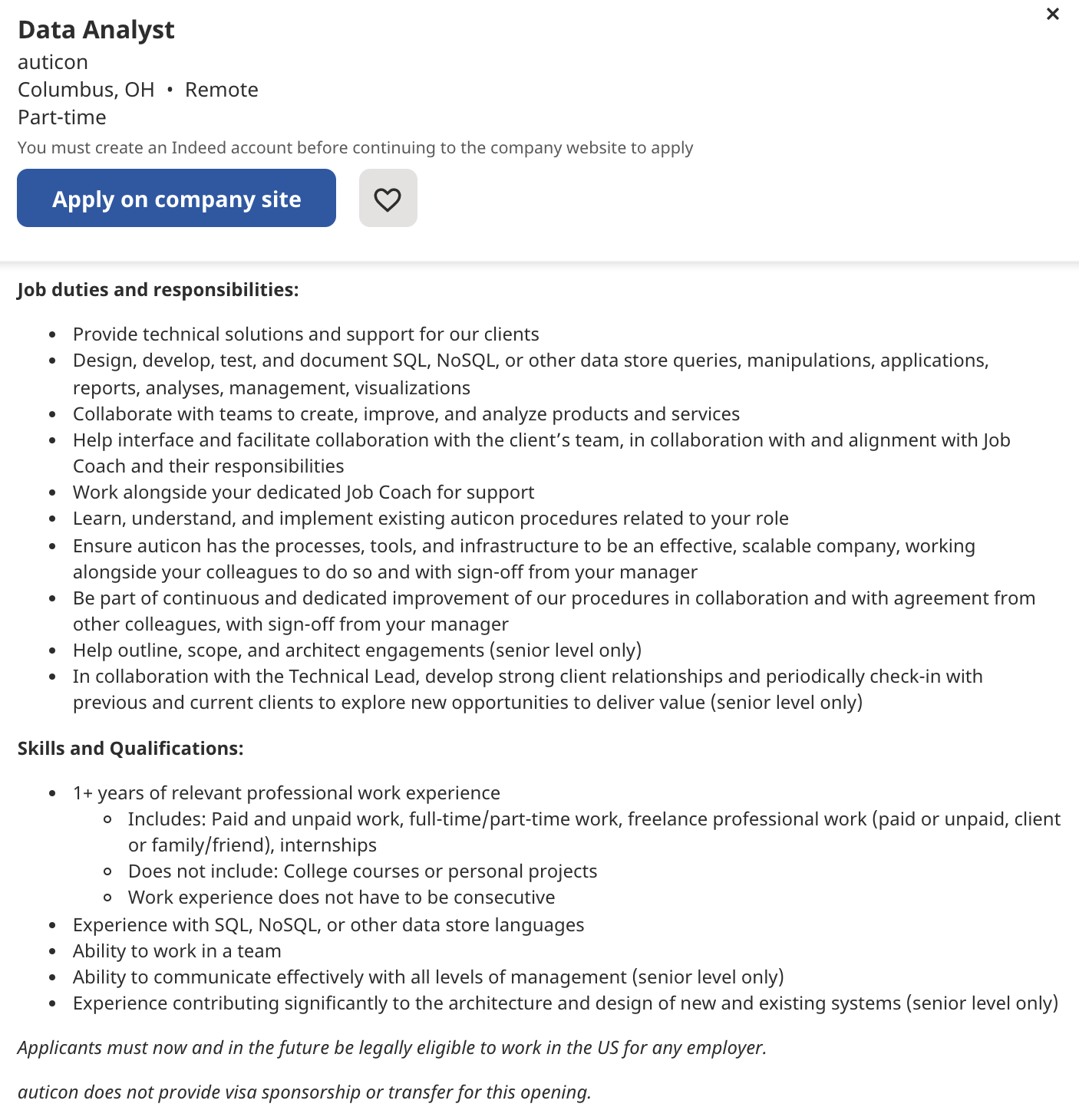
If you do not want to work full-time as a data analyst, you can choose to freelance instead. Many big and small companies need data analysis for price prediction, studying market trends, competitor analysis, and so much more.
Companies often hire freelance data analysts for the following purposes:
- Designing databases and data systems while correcting data-related errors
- Mining data from reliable sources and organizing it into a readable format for humans or machines
- Utilizing statistical tools for data interpretation and analysis
- Preparing reports for stakeholders and organizational leaders that predict outcomes or highlight trends and patterns
- Collaborating with other data analysts, engineers, programmers, and leaders to develop strategies for improvement
- Creating documentation for stakeholders to comprehend the data analysis steps so that the process can be replicated or duplicated if there is a need to do so
Requirements and Qualifications
To work as a freelance data analyst, you should have several technical skills, such as R, Python, SQL, Microsoft Excel, and data visualization tools. Many employers also prefer statistics and mathematical education backgrounds.
Aside from that, you need communication, decision-making, analytical and problem-solving skills.
Freelance Data Analyst Salary
On average, freelance data analysts earn $36 an hour or $74,481 a year. The highest earners take home up to $159,500, while the bottom 10% earn around $22,000.
If you want to build a career in data analytics without limiting yourself to a single employer, a freelancing position could benefit you.
Data Analyst Consultant
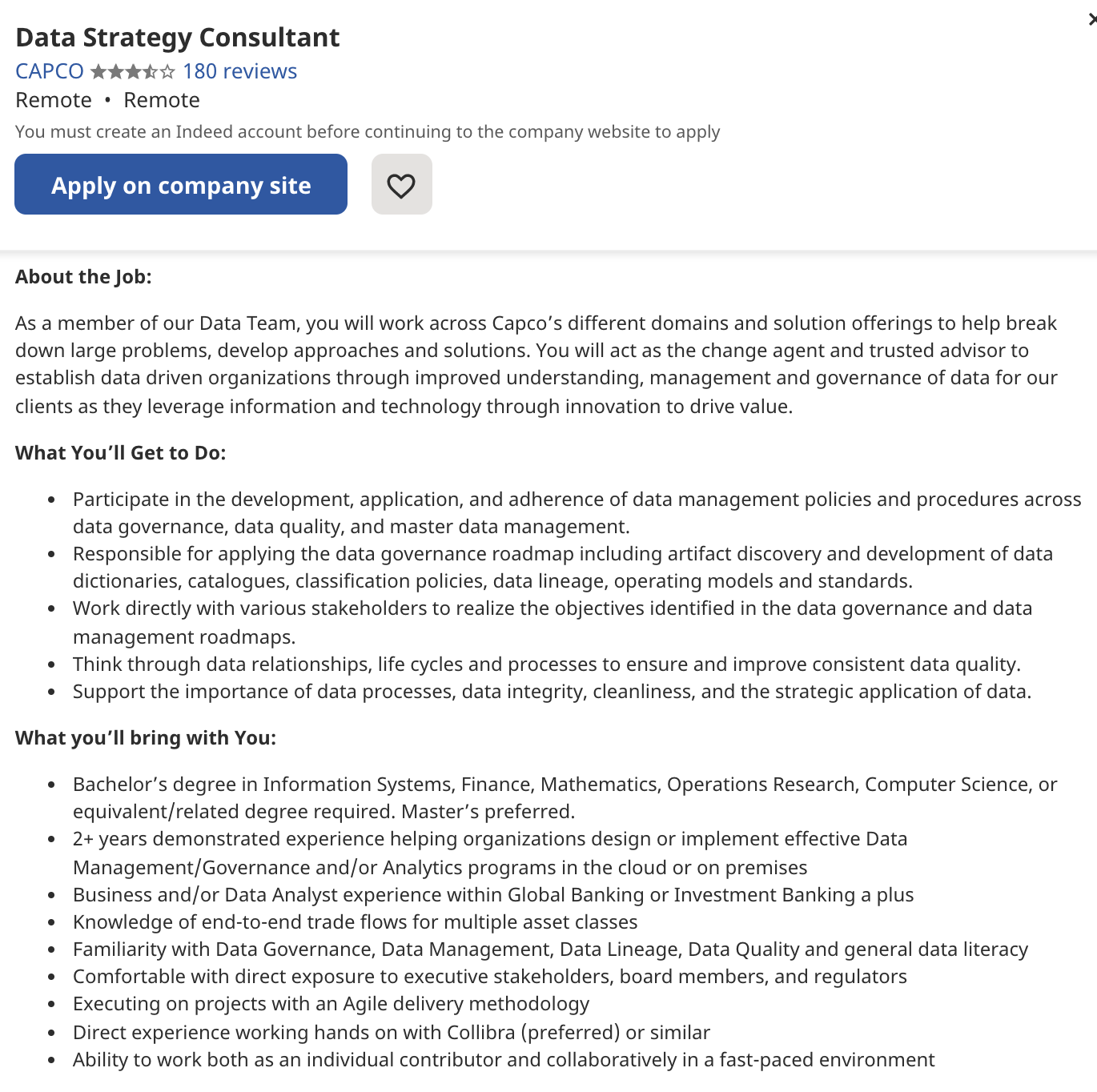
Data analyst consultants or system consultants work in various markets and industries, examining data processes and managing the organization’s data.
They couple the results from data analysis with insights to show the stakeholders possible opportunities for growth and improvement.
Consultants sometimes have to build spreadsheets and data flows, working with people from other departments and clients. Here are some roles and responsibilities of data analyst consultants:
- Maintaining integrity in business system analysis processes
- Designing plans and methodologies for data analysis and collection
- Interpreting data with other team members and developing appropriate action plans
- Performing physical data’s reverse engineering from SQL scripts and databases
- Analyzing physical databases and data models to identify discrepancies
Requirements and Qualifications
It is preferable for all careers in data analytics to have a bachelor’s degree in information technology, programming, computer science, management information systems, or mathematics.
According to Zippia data, 13.2% of data consultants have analytical skills, while 6.4% have data management skills.
Apart from this, you should also have all skills necessary to be a data analyst, including communication, teamwork, presentation, analytics, and critical thinking skills.
Data Analyst Consultant Salary
On average, data analysts in the U.S. make $83,000 a year. The higher end of the salary range goes to $106,000, while those at the lower end make $65,000 a year.
Even if you are working in the lower 10%, the salary is quite impressive.
Data Analyst Career Progression Tips

If you want to progress on your data analyst career path, make sure you follow these tips:
Grow Your Skills
The good news is that it’s possible to get a job as a data analyst without experience, but if you want to explore advanced careers in the field, you will need to grow your skills.
For instance, develop an understanding of IT systems or learn a programming language for advanced data analysis. The more skills you can list on your resume, the higher your chance of winning over other candidates.
Build Your Network
Along with growing your skills, you should also build your network. Doing so will help you land jobs in bigger and better workplaces while introducing you to new job opportunities in your field.
Work Across Teams and Projects When Possible
In cross-functional teamwork, you feel more connected to the organization and your peers. It also tends to make you better at problem-solving, which is the essence of data analytics.
Moreover, it helps you build connections and expand your network. You can get feedback from your seniors to improve your work going forward.
FAQs About a Career in Data Analytics
Are Data Analysts in High Demand?

Yes, data analysts are in high demand, as all organizations need data specialists to meet their business needs.
According to IBM, the number of jobs for data professionals in the U.S. was forecasted to increase from 364,000 positions to 2,720,000 only in 2020. Meanwhile, Glassdoor reports data scientist is the number one job on the website.
Do You Need a Degree To Become a Data Analyst?
You do not necessarily need a degree to become a data analyst, but a bachelor’s degree can help increase your chances of having a successful career in data analytics.
Moreover, getting a master’s degree can assist in your data analyst career progression.
Can You Become a Data Analyst With No Experience?
Yes, you can be a data analyst without any experience. Since there is a comprehensive range of job titles in data analytics, you can get into the field even with no experience.
However, if you want to progress to advanced data analytics careers, you need to have a minimum of five to 10 years of experience.
What’s the Difference Between a Data Analyst and a Data Scientist?
A data analyst uses existing methodologies and ways to collect data and analyze it. Meanwhile, a data scientist is involved in developing new data collection and analysis methods that are more efficient, accurate, and error-proof than the existing ones.
Both roles help collect actionable insights for an organization, but they may differ based on the tools and processes they use.
Since it is such an expansive field, there are many careers in data analytics and which one you choose will depend on your skills, expertise, and preference. The good news is that you do not need significant experience or high-level education to get into data analysis in an entry-level position.
Therefore, if you are dedicated to progress and keep improving your skills while networking, you can quickly find yourself on one of the many career paths discussed in this article.
Since you’re here…
Interested in a career in data analytics? You will be after scanning this data analytics salary guide. When you’re serious about getting a job, look into our 40-hour Intro to Data Analytics Course for total beginners, or our mentor-led Data Analytics Bootcamp.






